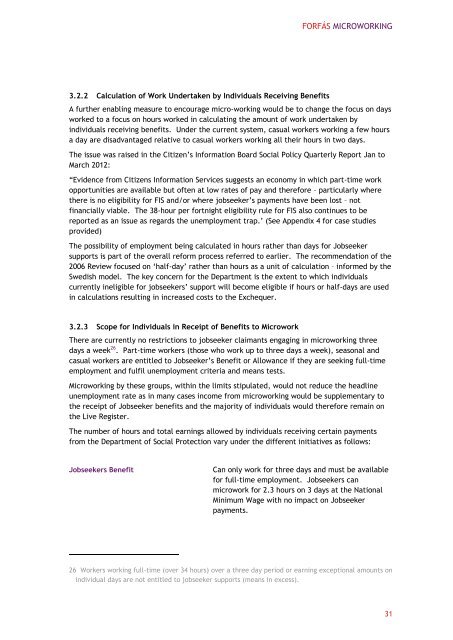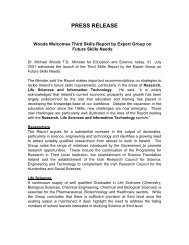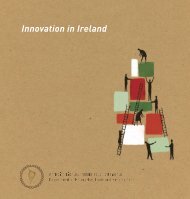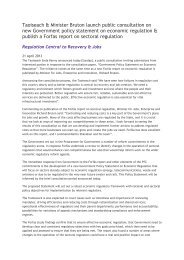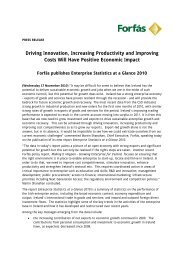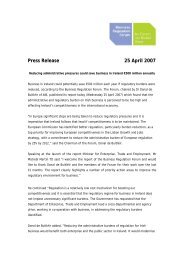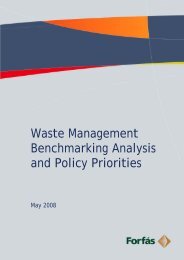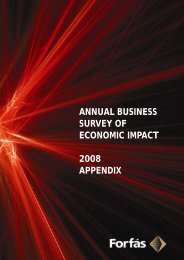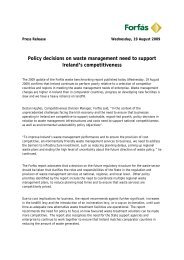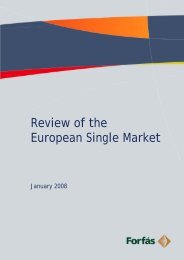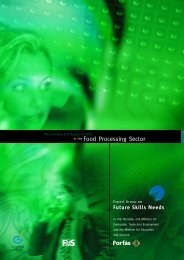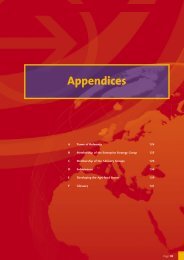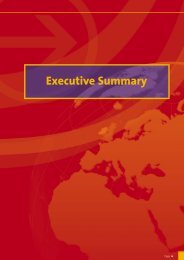Microworking (PDF, 59 pages, 1106KB) - Forfás
Microworking (PDF, 59 pages, 1106KB) - Forfás
Microworking (PDF, 59 pages, 1106KB) - Forfás
You also want an ePaper? Increase the reach of your titles
YUMPU automatically turns print PDFs into web optimized ePapers that Google loves.
FORFÁS MICROWORKING<br />
3.2.2 Calculation of Work Undertaken by Individuals Receiving Benefits<br />
A further enabling measure to encourage micro-working would be to change the focus on days<br />
worked to a focus on hours worked in calculating the amount of work undertaken by<br />
individuals receiving benefits. Under the current system, casual workers working a few hours<br />
a day are disadvantaged relative to casual workers working all their hours in two days.<br />
The issue was raised in the Citizen’s Information Board Social Policy Quarterly Report Jan to<br />
March 2012:<br />
“Evidence from Citizens Information Services suggests an economy in which part-time work<br />
opportunities are available but often at low rates of pay and therefore – particularly where<br />
there is no eligibility for FIS and/or where jobseeker’s payments have been lost – not<br />
financially viable. The 38-hour per fortnight eligibility rule for FIS also continues to be<br />
reported as an issue as regards the unemployment trap.’ (See Appendix 4 for case studies<br />
provided)<br />
The possibility of employment being calculated in hours rather than days for Jobseeker<br />
supports is part of the overall reform process referred to earlier. The recommendation of the<br />
2006 Review focused on ‘half-day’ rather than hours as a unit of calculation – informed by the<br />
Swedish model. The key concern for the Department is the extent to which individuals<br />
currently ineligible for jobseekers’ support will become eligible if hours or half-days are used<br />
in calculations resulting in increased costs to the Exchequer.<br />
3.2.3 Scope for Individuals in Receipt of Benefits to Microwork<br />
There are currently no restrictions to jobseeker claimants engaging in microworking three<br />
days a week 26 . Part-time workers (those who work up to three days a week), seasonal and<br />
casual workers are entitled to Jobseeker’s Benefit or Allowance if they are seeking full-time<br />
employment and fulfil unemployment criteria and means tests.<br />
<strong>Microworking</strong> by these groups, within the limits stipulated, would not reduce the headline<br />
unemployment rate as in many cases income from microworking would be supplementary to<br />
the receipt of Jobseeker benefits and the majority of individuals would therefore remain on<br />
the Live Register.<br />
The number of hours and total earnings allowed by individuals receiving certain payments<br />
from the Department of Social Protection vary under the different initiatives as follows:<br />
Jobseekers Benefit<br />
Can only work for three days and must be available<br />
for full-time employment. Jobseekers can<br />
microwork for 2.3 hours on 3 days at the National<br />
Minimum Wage with no impact on Jobseeker<br />
payments.<br />
26 Workers working full-time (over 34 hours) over a three day period or earning exceptional amounts on<br />
individual days are not entitled to jobseeker supports (means in excess).<br />
31


